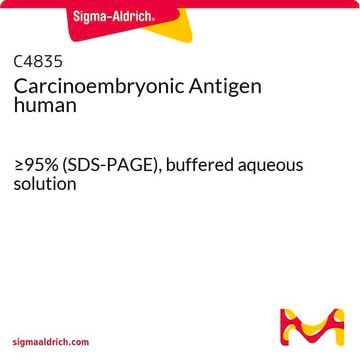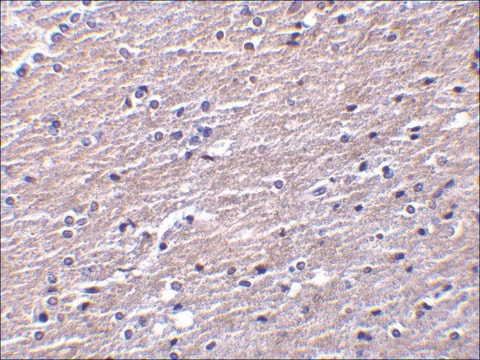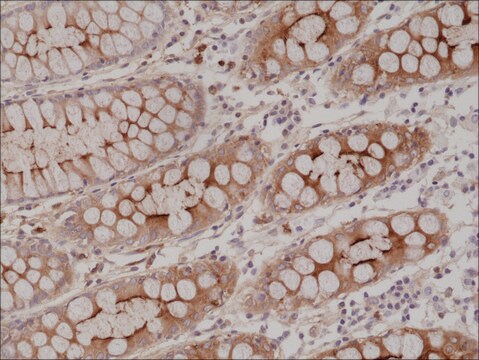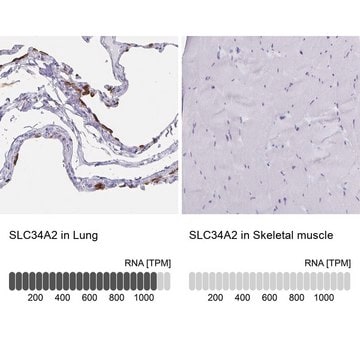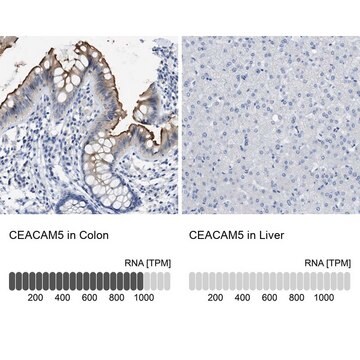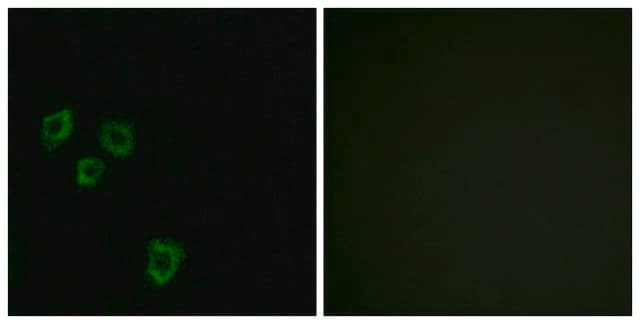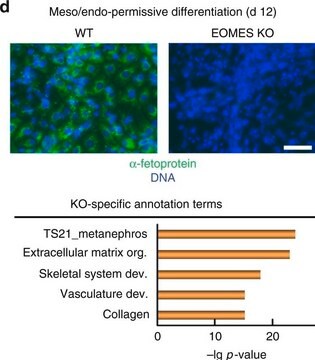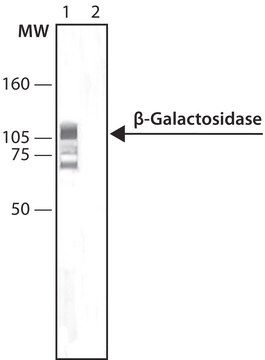おすすめの製品
由来生物
mouse
品質水準
結合体
unconjugated
抗体製品の状態
ascites fluid
抗体製品タイプ
primary antibodies
クローン
C6G9, monoclonal
含みます
15 mM sodium azide
化学種の反応性
human
テクニック
flow cytometry: suitable
immunohistochemistry (formalin-fixed, paraffin-embedded sections): 1:8,000 using human colon carcinoma tissue
western blot: suitable
アイソタイプ
IgG1
UniProtアクセッション番号
輸送温度
dry ice
保管温度
−20°C
ターゲットの翻訳後修飾
unmodified
遺伝子情報
human ... CEACAM5(1048)
詳細
Carcinoembryonic Antigen (CEA) is a member of the immunoglobulin superfamily that regulates cellular signaling and adhesion. CEA inhibits cell differentiation and subsequently facilitates tumor growth . Thus, CEA has been implicated in various cancers, including colorectal, lung and breast tumors
Monoclonal Anti-Human Carcinoembryonic Antigen (CEA) reacts specifically with human CEA (CD66e, 180 kDa) from different types of malignant tissues. The antibody detects an epitope which is resistant to 30 minute oxidation by 1% sodium periodate solution in formalin-fixed, paraffin-embedded tissue sections. Enzymatic predigestion with proteolytic enzymes enhances immunohistochemical staining with the antibody.The product reacts with medullary thyroid cancers and also associates with cell surface and cytoplasm of malignant glands in colorectal adenocarcinomas. Additionally, the product reacts weakly with normal colon mucosa and occasionally reacts with bile canalicular and pancreatic acinar cells. However, the antibody does not react with other tested tissue such as term placenta, nor does it bind to non-specific cross-reacting antigen (NCA) in granulocytes.
Monoclonal Anti-Human Carcinoembryonic Antigen (CEA) reacts specifically with human CEA (CD66e, 180 kDa) from different types of malignant tissues. The antibody detects an epitope which is resistant to 30 minute oxidation by 1% sodium periodate solution in formalin-fixed, paraffin-embedded tissue sections. Enzymatic predigestion with proteolytic enzymes enhances immunohistochemical staining with the antibody.The product reacts with medullary thyroid cancers and also associates with cell surface and cytoplasm of malignant glands in colorectal adenocarcinomas. Additionally, the product reacts weakly with normal colon mucosa and occasionally reacts with bile canalicular and pancreatic acinar cells. However, the antibody does not react with other tested tissue such as term placenta, nor does it bind to non-specific cross-reacting antigen (NCA) in granulocytes.
Carcinoembryonic Antigen (CEA) is located on human chromosome 19q13.2.
特異性
The antibody reacts specifically with human CEA (CD66e, 180 kDa) from several types of malignant tissue including colorectal, lung and breast tumors. It also stains medullary carcinomas of the thyroid. The product reacts strongly with the cell surface and cytoplasm of malignant glands in colorectal adenocarcinomas. A weak reactivity is seen with normal colon mucosa and occasionally with bile canalicular and pancreatic acinar cells, but not with other tested tissue including term placenta. There is no cross-reactivity with non-specific cross-reacting antigen (NCA) present in granulocytes, using immunoblotting, flow cytometry and immunohistochemical techniques. The antibody recognizes an epitope that is resistant to 30 minute oxidation by 1% sodium periodate solution in routine formalin-fixed and paraffin-embedded tissue sections. Enzymatic predigestion with proteolytic enzymes improves immunohistochemical staining with the antibody.
免疫原
carcinoembryonic antigen (CEA) isolated from a human colon adenocarcinoma cell line.
アプリケーション
Monoclonal Anti-Carcinoembryonic Antigen antibody is suitable for use in immunohistochemistry (1:8,000 using formalin-fixed, paraffin-embedded sections of human colon carcinoma tissue).
Monoclonal Anti-Carcinoembryonic Antigen antibody produced in mouse has been used in western blot analysis and surface plasmon resonance (SPR) based immunoassay.
生物化学的/生理学的作用
Carcinoembryonic Antigen (CEA) inhibits tumor growth in colon, hepatoma and prostate cancers.
免責事項
Unless otherwise stated in our catalog or other company documentation accompanying the product(s), our products are intended for research use only and are not to be used for any other purpose, which includes but is not limited to, unauthorized commercial uses, in vitro diagnostic uses, ex vivo or in vivo therapeutic uses or any type of consumption or application to humans or animals.
適切な製品が見つかりませんか。
製品選択ツール.をお試しください
保管分類コード
10 - Combustible liquids
WGK
nwg
引火点(°F)
Not applicable
引火点(℃)
Not applicable
適用法令
試験研究用途を考慮した関連法令を主に挙げております。化学物質以外については、一部の情報のみ提供しています。 製品を安全かつ合法的に使用することは、使用者の義務です。最新情報により修正される場合があります。WEBの反映には時間を要することがあるため、適宜SDSをご参照ください。
Jan Code
C2331-.5ML:
C2331-.2ML:
C2331-100UL:
C2331-BULK:
C2331-VAR:
試験成績書(COA)
製品のロット番号・バッチ番号を入力して、試験成績書(COA) を検索できます。ロット番号・バッチ番号は、製品ラベルに「Lot」または「Batch」に続いて記載されています。
この製品を見ている人はこちらもチェック
Characterizing the Tumor Suppressor Role of CEACAM1 in Multiple Myeloma
Xu J, et al.
Cellular Physiology and Biochemistry, 45(4), 1631-1640 (2018)
Virna Cortez-Retamozo et al.
Cancer research, 64(8), 2853-2857 (2004-04-17)
Nanobodies are the smallest fragments of naturally occurring single-domain antibodies that have evolved to be fully functional in the absence of a light chain. Nanobodies are strictly monomeric, very stable, and highly soluble entities. We identified a nanobody with subnanomolar
The role of the carcinoembryonic antigen receptor in colorectal cancer progression
Bajenova O, et al.
Journal of integrative oncology., 6(2), 192-192 (2017)
A genetic linkage map of the mouse: current applications and future prospects.
Copeland NG
Science, 262(5130), 57-66 (1993)
Marta Compte et al.
Oncoimmunology, 3, e28810-e28810 (2014-07-25)
Gene therapy to achieve in vivo secretion of recombinant anti-CD3 x anti-tumor bispecific antibodies in cancer patients is being explored as a strategy to counterbalance rapid renal elimination, thereby sustaining levels of bispecific antibodies in the therapeutic range. Here, we
ライフサイエンス、有機合成、材料科学、クロマトグラフィー、分析など、あらゆる分野の研究に経験のあるメンバーがおります。.
製品に関するお問い合わせはこちら(テクニカルサービス)